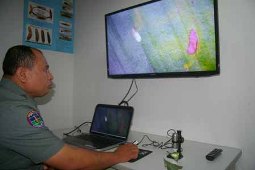 A
new project is underway in South-East Asia to share Australia's knowledge and
enthusiasm for protecting our borders from plant pests and diseases.
A
new project is underway in South-East Asia to share Australia's knowledge and
enthusiasm for protecting our borders from plant pests and diseases.
The project, funded by the Australian Centre for International Agricultural Research (ACIAR), aims to better equip Cambodia, Lao People's Democratic Republic (PDR) and Thailand to protect their crops from pests and diseases and improve international trading opportunities.
Plant pathologist from Charles Sturt University (CSU) Dr Ben Stodart, said, "Currently there is limited or no physical biosecurity and quarantine systems operating in Cambodia or Lao PDR."
The Postdoctoral Research Fellow in the University's School of Agricultural and Wine Sciences should know, having made more than 20 trips to Cambodia during his research career.
The new project, Enabling Improved Plant Biosecurity Practices in Cambodia, Lao PDR and Thailand, is funded by ACIAR through the Plant Biosecurity Co-operative Research Centre (CRC) and CSU.
"The challenges for these countries in improving plant biosecurity include a lack of local skilled staff and the retention of qualified staff, and inadequate information and physical resources, communication networks and organisational structures needed to produce lists of endemic pests and to identify exotic pests.
"These countries need effective biosecurity systems to meet the Sanitary and Phytosanitary (SPS) Agreement, a treaty of the World Trade Organisation (WTO) and a prerequisite in free-trade negotiations."
The project leader is plant pathologist Dr Gary Kong from Plant Biosecurity CRC, who along with Dr Stodart travelled to the three South-East Asian countries at the end of 2013 to attend planning workshops with the project's local partners.
"Initially we hope to build up local and in-country skills, resources and equipment which are required for the immediate response to threats to plants," Dr Stodart said.
"Then the more detailed analysis and diagnosis of pests and diseases will occur at high-end regional facilities.
"This will lead to the development of a knowledge network in the region. Research tasks will be specific to each partner country."
There are also clear benefits for Australia in the success of this ACIAR-funded project.
"The information on plant pests and diseases can feed into Australia's pre-border biosecurity inspections. If Australia has an early warning of any outbreak then, while we may not be able to prevent an incursion, we can be prepared and prevent an epidemic in Australian crops."
The project will run from 2014 to 2017.





Social
Explore the world of social